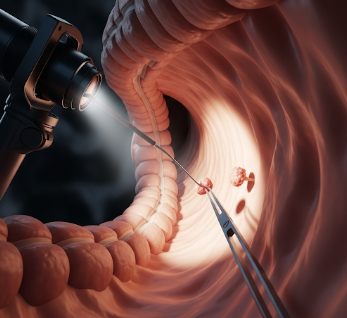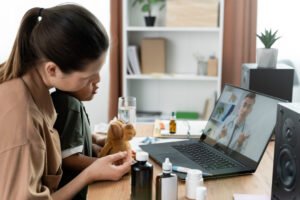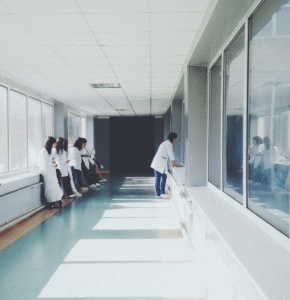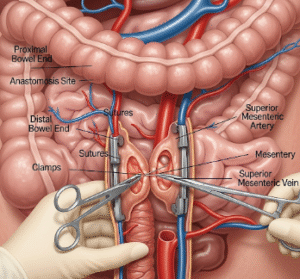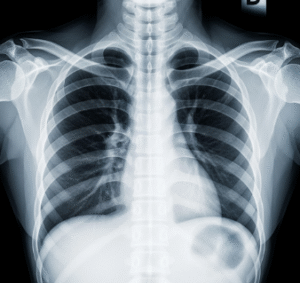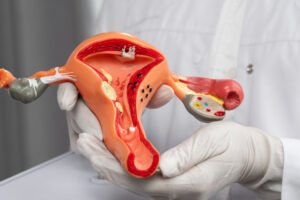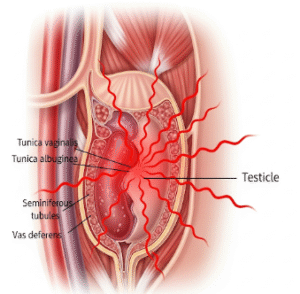Overview
Colonoscopy is a medical procedure used to examine the inner lining of the large intestine (colon and rectum). It allows doctors to detect, diagnose, and sometimes treat conditions such as polyps, cancer, inflammation, and bleeding.
Importance of colonoscopy:
- Detects colorectal cancer and precancerous polyps early.
- Identifies causes of unexplained gastrointestinal symptoms such as bleeding, pain, or diarrhea.
- Enables biopsy or removal of abnormal tissue during the procedure.
- Guides treatment and management of inflammatory bowel diseases and other conditions.
In South Korea, colonoscopy is performed in advanced gastroenterology centers and hospitals, with high-definition imaging, sedation options, and therapeutic interventions, ensuring accurate diagnosis and patient comfort.
Why It’s Done
Colonoscopy is indicated for diagnosis, screening, and treatment purposes.
Common indications include:
- ➤ Colorectal cancer screening: Especially for individuals over 45 or with family history.
- ➤ Evaluation of gastrointestinal bleeding: Identify source of blood in stool.
- ➤ Investigation of chronic diarrhea or constipation.
- ➤ Abdominal pain or unexplained weight loss.
- ➤ Surveillance of inflammatory bowel disease (IBD): Crohn’s disease or ulcerative colitis.
- ➤ Polyp detection and removal: Prevent progression to cancer.
Benefits for patients:
- ✔️ Detects early-stage colorectal cancer, improving survival rates.
- ✔️ Allows biopsy or therapeutic interventions during the same procedure.
- ✔️ Provides accurate assessment of colon health.
- ✔️ Guides preventive and long-term management of bowel diseases.
Alternatives
While colonoscopy is the gold standard, alternatives may be considered in select situations:
- ➤ Flexible sigmoidoscopy: Examines only the lower part of the colon.
- ➤ CT colonography (virtual colonoscopy): Non-invasive imaging of the colon.
- ➤ Stool-based tests: Fecal occult blood test (FOBT) or stool DNA tests for cancer screening.
- ➤ Barium enema: Rarely used; X-ray contrast imaging of the colon.
Key point: Colonoscopy allows direct visualization, biopsy, and therapeutic interventions, making it superior to most alternatives.
Preparation
Proper preparation is critical for a successful colonoscopy.
Steps include:
- ✅ Bowel preparation: Laxatives or cleansing solutions to empty the colon.
- ✅ Dietary restrictions: Clear liquid diet 24 hours before the procedure.
- ✅ Medication review: Adjust blood thinners or other medications as advised.
- ✅ Medical history review: Evaluate heart, kidney, and liver health.
- ✅ Consent: Discuss procedure, risks, sedation, and potential interventions.
- ✅ Transportation: Arrange for someone to accompany the patient due to sedation.
Important: Adequate bowel cleansing ensures clear visualization and accurate diagnosis.
How It’s Done
Colonoscopy is performed using a flexible, camera-equipped tube (colonoscope) under sedation or anesthesia.
Procedure steps:
- Sedation: Intravenous sedation to ensure comfort.
- Patient positioning: Usually lying on the left side.
- Insertion of colonoscope: Slowly advanced through the rectum to the cecum.
- Examination: High-definition camera visualizes the entire colon.
- Interventions: Polyps may be removed, and biopsies taken.
- Withdrawal and review: Colonoscope removed, findings documented.
Duration: 30–60 minutes
Hospital stay: Outpatient; most patients go home the same day.
Key point: Colonoscopy is safe, minimally invasive, and allows both diagnosis and treatment in a single procedure.
Recovery & Post-Procedure Care
Recovery from colonoscopy is generally quick and uncomplicated.
Immediate post-procedure:
- Monitor for vital signs and sedation effects.
- Rest in recovery area until alert and stable.
- Minor bloating or cramping may occur due to air insufflation.
Short-term care:
- Resume normal diet unless advised otherwise.
- Avoid heavy activity for the rest of the day.
- Monitor for bleeding or severe abdominal pain, which requires medical attention.
Long-term outcomes:
- Early detection of polyps or cancer improves long-term prognosis.
- Routine surveillance colonoscopies may be recommended every 3–10 years depending on findings.
Important: Following post-procedure instructions ensures safety and early identification of complications.
Possible Complications
Colonoscopy is generally safe, but potential risks include:
- ⚠️ Bleeding: Usually minor; can occur after biopsy or polyp removal.
- ⚠️ Perforation: Rare but serious tear in the colon wall.
- ⚠️ Sedation-related complications: Respiratory or cardiovascular issues.
- ⚠️ Abdominal discomfort or bloating: Usually temporary.
- ⚠️ Infection: Extremely rare due to sterile technique.
In South Korea, colonoscopy is performed with state-of-the-art equipment, trained gastroenterologists, and strict safety protocols, minimizing the risk of complications.
Treatment Options / Clinical Relevance in Korea
Colonoscopy is a widely available procedure in South Korea, essential for screening, diagnosis, and therapeutic interventions in gastrointestinal medicine.
Key features:
- 🏥 High-definition and advanced imaging colonoscopes ensure accurate diagnosis.
- 🏥 Sedation options enhance patient comfort during the procedure.
- 🏥 Polyp removal and biopsy can be performed simultaneously.
- 🏥 Outpatient procedure with rapid recovery.
- 🏥 Integrated care with gastroenterology, oncology, and surgery teams.
Hospitals performing colonoscopy in Korea:
- Seoul National University Hospital – Advanced endoscopy and screening programs
- Asan Medical Center – Therapeutic colonoscopy for polyps and IBD management
- Samsung Medical Center – High-definition colonoscopy with sedation
- Local tertiary hospitals – Accessible nationwide with experienced gastroenterologists
Highlights in Korea:
- ✔️ Early detection of colorectal cancer improves survival rates.
- ✔️ Minimally invasive, safe, and effective procedure.
- ✔️ Combines diagnostic and therapeutic capabilities in a single visit.
- ✔️ Nationwide availability in specialized hospitals and clinics.
Highlights
- ➤ Colonoscopy examines the colon for cancer, polyps, inflammation, or bleeding.
- ➤ Indicated for screening, gastrointestinal symptoms, polyp removal, or IBD surveillance.
- ➤ Alternatives include flexible sigmoidoscopy, CT colonography, stool-based tests, or barium enema.
- ➤ Preparation involves bowel cleansing, dietary adjustments, and consent.
- ➤ Procedure is outpatient, 30–60 minutes, with sedation and advanced imaging.
- ➤ Recovery includes monitoring, gradual diet resumption, and symptom observation.
- ➤ South Korea offers advanced, safe colonoscopy with therapeutic options and nationwide accessibility.

